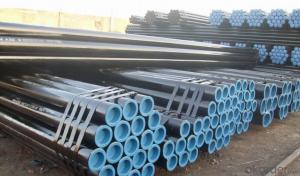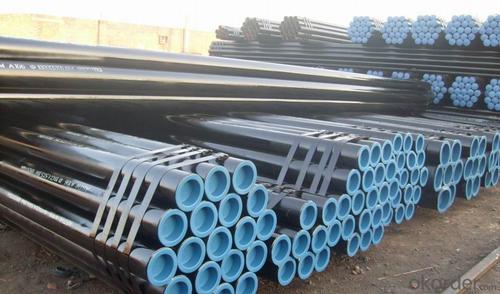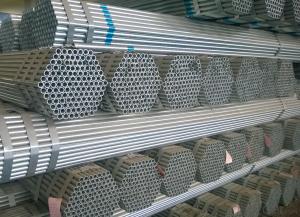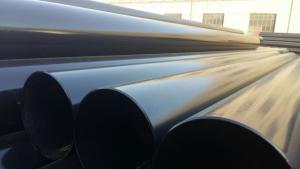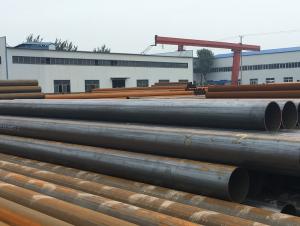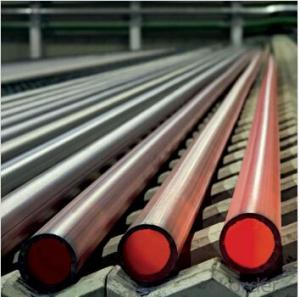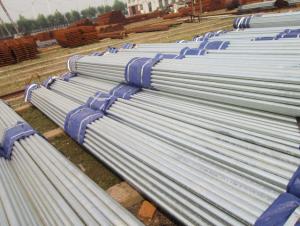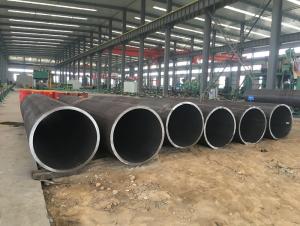Seamless steel tubes for high pressure fluids
- Loading Port:
- Tianjin
- Payment Terms:
- TT or LC
- Min Order Qty:
- 35 m.t.
- Supply Capability:
- 15000 m.t./month
OKorder Service Pledge
OKorder Financial Service
You Might Also Like
1、Structure of Seamless steel tubes for high pressure fluids:
Seamless pipe is formed by drawing a solid billet over a piercing rod to create the hollow shell. As the manufacturing process does not include any welding, seamless pipes are perceived to be stronger and more reliable. Historically seamless pipe was regarded as withstanding pressure better than other types, and was often more easily available than welded pipe.
2、Main Features of Seamless steel tubes for high pressure fluids:
• High manufacturing accuracy
• High strength
• Small inertia resistance
• Strong heat dissipation ability
• Good visual effect
• Reasonable price
3、 Seamless steel tubes for high pressure fluids Specification:
Standard | GB, DIN, ASTM ASTM A106-2006, ASTM A53-2007 |
Grade | 10#-45#, 16Mn 10#, 20#, 45#, 16Mn |
Thickness | 8 - 33 mm |
Section Shape | Round |
Outer Diameter | 133 - 219 mm |
Place of Origin | Shandong, China (Mainland) |
Secondary Or Not | Non-secondary |
Application | Hydraulic Pipe |
Technique | Cold Drawn |
Certification | API |
Surface Treatment | factory state or painted black |
Special Pipe | API Pipe |
Alloy Or Not | Non-alloy |
Length | 5-12M |
Outer Diameter | 21.3-610mm |
Grade | 20#, 45#, Q345, API J55, API K55, API L80, API N80, API P110, A53B |
Standard | ASME, ASTM |
1) Material:20#(ASTM A 106/A53 GRB.API5LGRB,GB),45#,16Mn,10#.
2) Specification range:OD:21.3-610mm,WT:6-70mm,length:6-12m or according to the requirement of clients.
3) Excutive standards:GB,ASME API5L.ASTM A 106/A53,Despite of the above standards,we can also supply seamless steel pipe with standard of DIN,JIS,and so on,and also develop new products according to the requirements of our clients!
4) Surface:black lacquered,varnish coating or galvanized.
5) Ends:Beveled or square cut,plastic capped,painted.
6) Packing:bundles wrapped with strong steel strip,seaworthy packing.
4、Packaging & Delivery
Packaging Details: | seaworthy package,bundles wrapped with strong steel strip |
Delivery Detail: | 15-30days after received 30%TT |
5、FAQ of Seamless steel tubes for high pressure fluids:
products are manufactured strictly according to national and internaional standard, and we take a test
on every pipe before delivered out. If you want see our quality certifications and all kinds of testing report, please just ask us for it.
Guaranteed: If products’ quality don’t accord to discription as we give or the promise before you place order, we promise 100% refund.
Why should you chose us?
Chose happens because of quality, then price, We can give you both.Additionally, we can also offer professional products inquiry, products knowledge train(for agents), smooth goods delivery, exellent customer solution proposals.Our service formula: good quality+good price+good service=customer’s trust
SGS test is available, customer inspection before shipping is welcome, third party inspection is no problem.
6、 Seamless steel tubes for high pressure fluids Images:
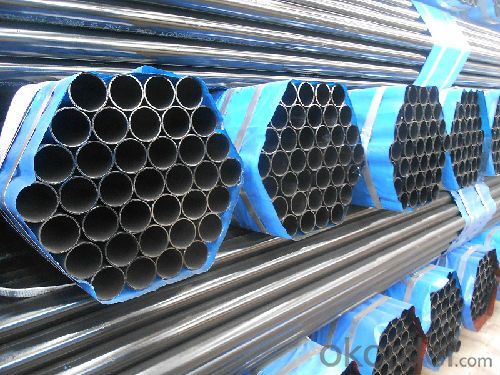
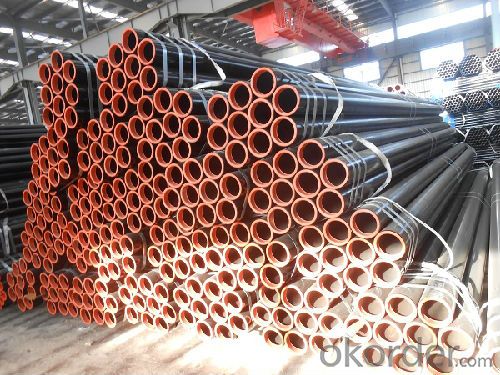
- Q: How are steel pipes used in natural gas processing plants?
- Steel pipes are used in natural gas processing plants to transport and distribute natural gas from one point to another within the facility. These pipes are capable of withstanding high pressure and temperature, ensuring the safe and efficient flow of the gas throughout the plant. Additionally, steel pipes are resistant to corrosion, which is crucial as natural gas can be corrosive. They are also used for connecting various equipment and components in the processing plant, allowing for the smooth operation of the entire system.
- Q: How are steel pipes used in irrigation systems?
- Steel pipes are commonly used in irrigation systems as they offer durability, strength, and corrosion resistance. These pipes are used to transport water from a water source to the fields or crops being irrigated. Their smooth interior surface allows for efficient water flow, and their high-pressure rating ensures that water reaches the desired areas with adequate force. Additionally, steel pipes are often used in underground irrigation systems due to their ability to withstand external pressures and protect the water supply from potential damage.
- Q: How do you connect steel pipes together?
- To connect steel pipes together, there are several methods commonly used in various industries. One commonly used method is welding. Welding involves heating the ends of the steel pipes and then joining them together using a welding rod or wire. This method creates a strong and durable connection that is capable of withstanding high pressures and temperatures. Another method is threading, where threads are cut into the ends of the steel pipes. These threaded ends can then be screwed together using pipe fittings such as couplings or unions. Threading is commonly used for smaller diameter pipes and is advantageous as it allows for easy disassembly and reassembly of the pipes. Flanges can also be used to connect steel pipes together. Flanges are flat, circular discs with holes in them that can be bolted together. They provide a strong and secure connection, especially for large diameter pipes or pipes that need to be easily disconnected for maintenance or repairs. Pipe fittings such as couplings, tees, elbows, or reducers can also be used to connect steel pipes together. These fittings are typically made of steel or other materials and are designed to be welded, threaded, or connected using other methods like grooving or compression. It's important to note that the method used to connect steel pipes together will depend on various factors such as the pipe size, the application, the required strength, and the specific industry standards or codes that need to be followed. Therefore, it's essential to consult with a qualified professional or refer to industry-specific guidelines when choosing the appropriate method for joining steel pipes.
- Q: How are steel pipes used in the construction of bridges?
- Steel pipes are commonly used in the construction of bridges as they provide structural support and stability. These pipes are used for various purposes, such as creating the framework, piling, and supporting the bridge's weight. Additionally, steel pipes are often used in the construction of bridge piers and abutments, as well as for drainage systems and utility tunnels. Their high strength and durability make steel pipes essential components in ensuring the safety and longevity of bridge structures.
- Q: Are steel pipes more expensive than other types of pipes?
- The cost of steel pipes can vary compared to other pipe types due to various factors. In terms of upfront cost, steel pipes are generally more expensive than certain pipe types. This is primarily because the production process and raw materials for steel pipes are highly costly. Additionally, steel pipes are renowned for their strength and durability, making them a popular option for applications involving high pressure or extreme conditions. However, when considering long-term costs and benefits, steel pipes are often more economically viable. They have a longer lifespan compared to certain pipes, reducing the need for frequent repairs or replacements. Furthermore, steel pipes possess excellent corrosion resistance, making them suitable for diverse environments and reducing maintenance expenses over time. Moreover, the strength and durability of steel pipes contribute to a reduced likelihood of leaks or failures, resulting in significant cost savings to prevent damage or loss. When comparing the cost of steel pipes to other pipe types, it is crucial to consider the specific requirements and characteristics of the project or application. Factors like the transported fluid or material, required pressure rating, expected lifespan, and environmental conditions should all be taken into account. Ultimately, despite steel pipes having a higher upfront cost, their long-term durability and reliability often make them a cost-effective choice in numerous applications.
- Q: Are steel pipes suitable for underground gas lines?
- Indeed, underground gas lines can be effectively constructed using steel pipes. Renowned for their robustness and longevity, steel pipes are a dependable option for distributing gas underground. Their exceptional resistance to external elements, including corrosion and impact, is crucial for upholding the gas system's integrity. Moreover, steel pipes possess the ability to endure high pressure and temperature fluctuations, guaranteeing the secure and efficient transportation of gas beneath the surface. Nonetheless, it is vital to emphasize the significance of adhering to proper installation techniques, such as implementing corrosion protection measures, in order to ensure the steel pipes' durability and prevent any potential leaks or accidents.
- Q: Can steel pipes be used for transporting gases and liquids?
- Yes, steel pipes can be used for transporting both gases and liquids. Steel pipes are highly durable, corrosion-resistant, and have excellent strength, making them suitable for various applications, including oil and gas pipelines, water supply systems, and industrial processes.
- Q: How are steel pipes used in the renewable energy industry?
- Steel pipes are widely used in the renewable energy industry for various purposes. They are commonly used in the construction of wind turbine towers, where they provide structural support and stability. Steel pipes are also used in the installation of solar panel systems, serving as a reliable conduit for transporting fluids, such as water or heat transfer fluids, within the system. Additionally, steel pipes are utilized in the transportation of renewable energy resources, such as natural gas or hydrogen, as they offer durability and strength to withstand high-pressure conditions.
- Q: How are steel pipes used in the construction of underground parking garages?
- Steel pipes are used in the construction of underground parking garages for various purposes, including providing structural support, serving as conduits for utilities such as water and electricity, and facilitating drainage systems. They are often used as deep foundation elements to support the weight of the structure and the vehicles above. Additionally, steel pipes are commonly used for installing fire suppression systems, ventilation systems, and plumbing connections within the parking garage.
- Q: How are steel pipes repaired if they develop leaks?
- Steel pipes can be repaired if they develop leaks through various methods such as welding, clamping, or using epoxy compounds. The specific repair technique depends on the size and location of the leak as well as the type of pipe, and it is typically carried out by trained professionals with the necessary equipment and expertise.
Send your message to us
Seamless steel tubes for high pressure fluids
- Loading Port:
- Tianjin
- Payment Terms:
- TT or LC
- Min Order Qty:
- 35 m.t.
- Supply Capability:
- 15000 m.t./month
OKorder Service Pledge
OKorder Financial Service
Similar products
Hot products
Hot Searches
Related keywords
